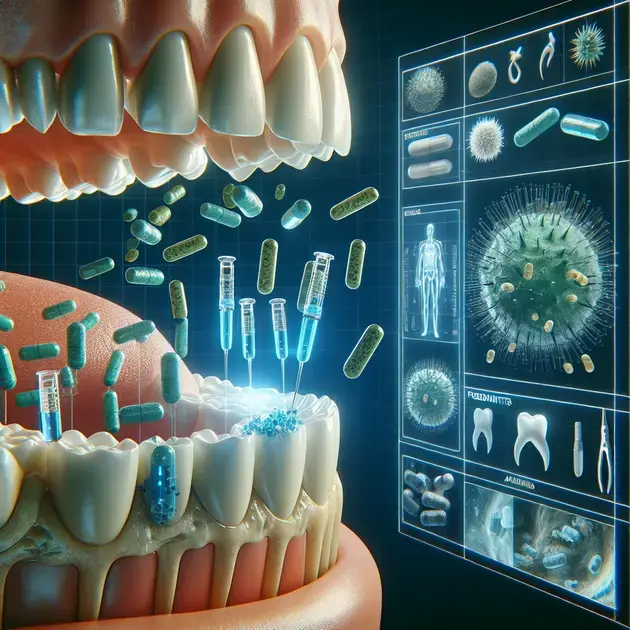Looking for effective medication for periodontitis? You’ve come to the right place. In this comprehensive guide, we will explore the latest treatments and strategies to help combat this common dental problem.
Periodontitis, a severe form of gum disease, affects millions of people worldwide. It is crucial to stay informed about the most recent advancements in treatment options to properly manage and prevent the progression of this condition.

Understanding Periodontitis: Causes and Symptoms
Periodontitis is a serious gum infection that damages the soft tissue and destroys the bone that supports your teeth. It is caused by bacteria found in plaque, a sticky film that forms on your teeth. Poor oral hygiene, smoking, certain medications, and genetic factors can increase the risk of developing periodontitis. The symptoms of periodontitis include swollen or bleeding gums, persistent bad breath, loose teeth, and receding gums.
To understand the causes of periodontitis better, it is essential to visit a dentist regularly for check-ups and cleanings. Additionally, educational resources such as the website of the American Academy of Periodontology (https://www.perio.org/) provide detailed information on the causes and symptoms of periodontitis. By learning more about the condition, individuals can take proactive steps to prevent its progression.
Exploring Treatment Options for Periodontitis
When it comes to treating periodontitis, early detection is key to preventing further damage to the gums and bone. The first step in treatment usually involves a deep cleaning procedure called scaling and root planing, where the built-up plaque and tartar are removed from the teeth and roots. In more severe cases, surgical interventions such as flap surgery or bone and tissue grafts may be necessary.
For individuals exploring treatment options for periodontitis, consulting with a periodontist is recommended. Websites like the American Dental Association (https://www.ada.org/) provide a directory of certified periodontists who specialize in treating gum diseases. By seeking professional advice and following a customized treatment plan, patients can effectively manage their periodontitis and improve their oral health.
Tips for Preventing Periodontitis
Preventing periodontitis starts with good oral hygiene habits, such as brushing your teeth twice a day, flossing daily, and using an antiseptic mouthwash. Regular dental check-ups and cleanings are also essential for early detection of any signs of gum disease. Avoiding smoking and maintaining a healthy diet rich in fruits and vegetables can further reduce the risk of developing periodontitis.
To enhance your preventive efforts, consider using apps like Oral-B, which provide personalized oral care tips and reminders for maintaining good oral health habits. These apps can track your brushing and flossing routines, ensuring that you are following the recommended guidelines for preventing periodontitis. By incorporating these tips into your daily routine, you can significantly reduce the likelihood of developing gum disease.

Understanding Targeted Antibiotics in Periodontitis Treatment
Periodontitis is a common dental condition characterized by inflammation and infection of the gums. Targeted antibiotics play a crucial role in the treatment of periodontitis by specifically targeting the bacteria responsible for the infection. By using antibiotics that are tailored to the specific bacteria present in the patient’s mouth, healthcare providers can effectively combat the infection and promote healing.
One of the key benefits of targeted antibiotics in periodontitis treatment is their ability to minimize the development of antibiotic resistance. Unlike broad-spectrum antibiotics that can kill a wide range of bacteria, targeted antibiotics focus only on the specific strains that are causing the infection. This targeted approach reduces the likelihood of bacteria developing resistance to the antibiotic, ensuring that the treatment remains effective over time.
Additionally, targeted antibiotics in periodontitis treatment can help reduce the risk of side effects associated with broad-spectrum antibiotics. By specifically targeting the bacteria responsible for the infection, healthcare providers can minimize the impact on the patient’s overall oral microbiome, decreasing the likelihood of experiencing adverse reactions to the medication.
Overall, understanding the role of targeted antibiotics in periodontitis treatment is essential for healthcare providers to effectively manage this common dental condition. By tailoring antibiotic therapy to the specific bacteria present in the patient’s mouth, providers can maximize treatment efficacy while minimizing the risk of antibiotic resistance and side effects.
Optimizing the use of targeted antibiotics in periodontitis treatment requires a comprehensive understanding of the patient’s oral microbiome and the specific bacteria causing the infection. By conducting thorough diagnostic tests and selecting the most appropriate antibiotic therapy, healthcare providers can ensure the best possible outcome for their patients.
Maximizing Treatment Efficacy with Targeted Antibiotic Therapies
When it comes to treating periodontitis, targeted antibiotic therapies offer a highly effective solution for combating the infection and promoting gum health. By specifically targeting the bacteria responsible for the infection, these therapies can deliver more precise and efficient treatment outcomes compared to broad-spectrum antibiotics.
One of the key advantages of targeted antibiotic therapies is their ability to penetrate deep into the gum tissues where the infection is located. By directly targeting the bacteria in these hard-to-reach areas, healthcare providers can effectively eliminate the source of the infection and facilitate the healing process.
Furthermore, targeted antibiotic therapies can help reduce the need for surgical intervention in some cases of severe periodontitis. By effectively controlling the bacterial infection with antibiotics, healthcare providers may be able to avoid more invasive treatment procedures, leading to quicker recovery times and improved patient outcomes.
Maximizing treatment efficacy with targeted antibiotic therapies also involves developing personalized treatment plans based on the individual patient’s needs. By considering factors such as the severity of the infection, the patient’s overall health, and any allergies or sensitivities to antibiotics, healthcare providers can tailor the treatment approach to optimize results.
In conclusion, targeted antibiotic therapies represent a valuable innovation in the field of periodontitis treatment, offering efficient and precise solutions for combating bacterial infections and promoting gum health. By understanding the benefits of targeted antibiotics and incorporating them into comprehensive treatment plans, healthcare providers can maximize treatment efficacy and improve patient outcomes.
Innovations in Targeted Antibiotics for Improved Gum Health
The development of innovative targeted antibiotics has revolutionized the treatment of gum diseases such as periodontitis, offering new possibilities for improved gum health outcomes. These advanced antibiotics are designed to specifically target the bacteria responsible for gum infections, providing more targeted and effective treatment options for patients.
One notable innovation in targeted antibiotics for gum health is the use of nanotechnology to enhance drug delivery to the site of infection. Nanoparticles can be coated with antibiotic agents and designed to penetrate deep into the gum tissues, delivering a concentrated dose of medication directly to the source of the infection for enhanced effectiveness.
Another innovation in targeted antibiotics is the development of personalized antibiotic therapies based on genetic testing of the bacteria present in the patient’s mouth. By identifying the specific strains of bacteria causing the infection, healthcare providers can tailor the antibiotic therapy to target those strains more effectively, increasing the likelihood of successful treatment outcomes.
Furthermore, ongoing research in the field of targeted antibiotics is focusing on the development of novel antibiotic agents with enhanced antimicrobial properties and reduced side effects. By exploring new compounds and formulations, researchers aim to improve the efficacy of targeted antibiotics while minimizing the impact on the patient’s oral microbiome.
Overall, the continuous innovations in targeted antibiotics for improved gum health hold great promise for the future of periodontitis treatment. By harnessing the power of advanced drug delivery systems, personalized therapies, and novel antibiotic agents, healthcare providers can enhance treatment outcomes and promote better gum health for their patients.
Conclusion
In conclusion, targeted antibiotics play a pivotal role in the effective treatment of periodontitis by specifically addressing the bacteria responsible for the infection, promoting healing, and minimizing antibiotic resistance. By tailoring antibiotic therapy to the patient’s oral microbiome, healthcare providers can enhance treatment efficacy while reducing side effects and risks associated with broad-spectrum antibiotics. The precise nature of targeted antibiotic therapies allows for deeper penetration into gum tissues, eliminating bacterial sources of infection and potentially avoiding the need for surgical interventions in severe cases.
Moreover, innovations in targeted antibiotics, such as nanotechnology-enhanced drug delivery and personalized antibiotic therapies based on genetic testing, are revolutionizing gum health treatment. These advancements offer more targeted and efficient solutions for combating gum infections while minimizing adverse effects on the patient’s oral microbiome. Ongoing research focusing on novel antibiotic agents aims to improve antimicrobial properties and decrease side effects, promising a brighter future for periodontitis treatment.
By incorporating targeted antibiotic therapies into comprehensive treatment plans, healthcare providers can maximize treatment outcomes and improve patient results. Understanding the benefits of targeted antibiotics is crucial in managing periodontitis effectively. Through a personalized approach that considers individual patient needs, severity of infection, and health factors, targeted antibiotic therapies can optimize treatment efficacy and promote better gum health, ultimately leading to improved patient outcomes and enhanced overall oral health.



